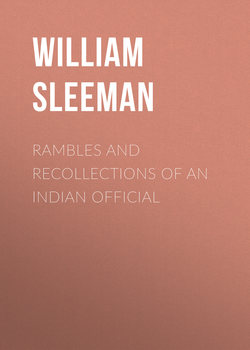Читать книгу Rambles and Recollections of an Indian Official - William Sleeman - Страница 35
RAMBLES AND RECOLLECTIONS
CHAPTER 29
ОглавлениеInterview with the Chiefs of Jhānsī—Disputed Succession
On the 14th396 we came on fourteen miles to Jhānsī.397 About five miles from our last ground we crossed the Baitantī river over a bed of syenite. At this river we mounted our elephant to cross, as the water was waist-deep at the ford. My wife returned to her palankeen as soon as we had crossed, but our little boy came on with me on the elephant, to meet the grand procession which I knew was approaching to greet us from the city. The Rājā of Jhānsī, Rām Chandar Rāo, died a few months ago, leaving a young widow and a mother, but no child.398
He was a young man of about twenty-eight years of age, timid, but of good capacity, and most amiable disposition. My duties brought us much into communication; and, though we never met, we had conceived a mutual esteem for each other. He had been long suffering from an affection of the liver, and had latterly persuaded himself that his mother was practising upon his life, with a view to secure the government to the eldest son of her daughter, which would, she thought, ensure the real power to her for life. That she wished him dead with this view, I had no doubt; for she had ruled the state for several years up to 1831, during what she was pleased to consider his minority; and she surrendered the power into his hands with great reluctance, since it enabled her to employ her paramour as minister, and enjoy his society as much as she pleased, under the pretence of holding privy councils upon affairs of great public interest.399 He used to communicate his fears to me; and I was not without apprehension that his mother might some day attempt to hasten his death by poison. About a month before his death he wrote to me to say that spears had been found stuck in the ground, under the water where he was accustomed to swim, with their sharp points upwards; and, had he not, contrary to his usual practice, walked into the water, and struck his foot against one of them, he must have been killed. This was, no doubt, a thing got up by some designing person who wanted to ingratiate himself with the young man; for the mother was too shrewd a woman ever to attempt her son's life by such awkward means. About four months before I reached the capital, this amiable young prince died, leaving two paternal uncles, a mother, a widow, and one sister, the wife of one of our Sāgar pensioners, Morīsar Rāo. The mother claimed the inheritance for her grandson by this daughter, a very handsome young lad, then at Jhānsī, on the pretence that her son had adopted him on his death-bed. She had his head shaved, and made him go through all the other ceremonies of mourning, as for the death of his real father. The eldest of his uncles, Raghunāth Rāo, claimed the inheritance as the next heir; and all his party turned the young lad out of caste as a Brahman, for daring to go into mourning for a father who was yet alive; one of the greatest of crimes, according to Hindoo law, for they would not admit that he had been adopted by the deceased prince.400
396
December, 1835.
397
Now the head-quarters of the British district of the same name, and also of the Indian Midland Railway. Since the opening of this railway and the restoration of the Gwālior fort to Sindhia in 1886, the importance of Jhānsī, both civil and military, has much increased. The native town was given up by Sindhia in exchange for the Gwālior stronghold.
398
This chief is called Rājā Rāo Rāmchand in the N.W.P. Gazetteer, 1st ed. He died on August 20, 1835. His administration had been weak, and his finances were left in great disorder. Under his successor the disorder of the administration became still greater.
399
Dowagers in Indian princely families are frequently involved in such intrigues and plots. The editor could specify instances in his personal experience. Compare Chapter 34, post.
400
An adopted son passes completely out of the family of his natural, into that of his adoptive, father, all his rights and duties as a son being at the same time transferred. In this case, the adoption had not really taken place, and the lad's duty to his living natural father remained unaffected.
